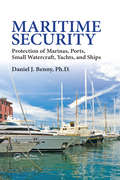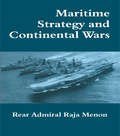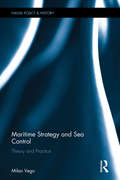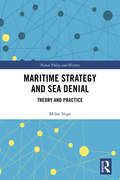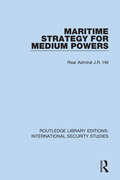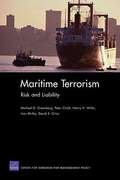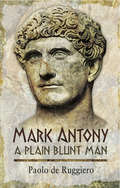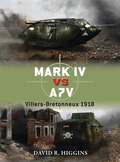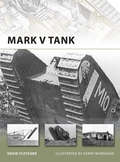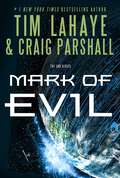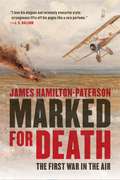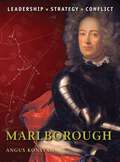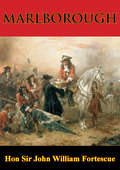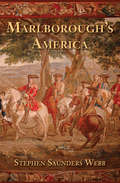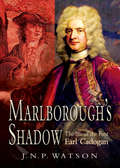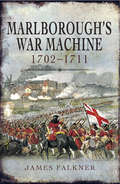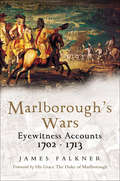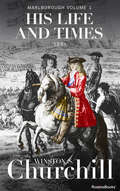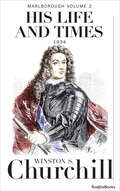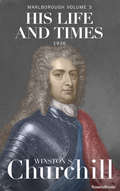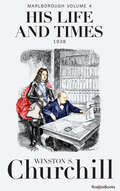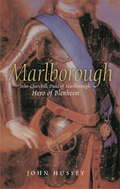- Table View
- List View
Maritime Security: Protection of Marinas, Ports, Small Watercraft, Yachts, and Ships
by Ph.D, Daniel BennyIn a time when threats against the maritime community have never been greater, Maritime Security: Protection of Marinas, Ports, Small Watercraft, Yachts, and Ships provides a single, comprehensive source of necessary information for understanding and preventing or reducing threats to the maritime community.The book defines what comprises the mariti
Maritime Strategy and Continental Wars (Cass Series: Naval Policy and History #No. 3)
by Rear Admiral MenonRear Admiral Raja Menon contends that nations embroiled in Continental wars have historically had poor maritime strategies. He develops the argument that navies that have been involved in such wars have made poor contributions to politial objectives, and outlines future strategies.
Maritime Strategy and Sea Control: Theory and Practice (Cass Series: Naval Policy and History)
by Milan VegoThis book focuses on the key naval strategic objectives of obtaining and maintaining sea control. During times of war, sea control, or the ability of combatants to enjoy naval dominance, plays a crucial role in that side’s ability to attain overall victory. This book explains and analyzes in much greater detail sea control in all its complexities, and describes the main methods of obtaining and maintaining it. Building on the views of naval classical thinkers, this book utilizes historical examples to illustrate the main methods of sea control. Each chapter focuses on a particular method, including destroying the enemy forces by a decisive action, destroying enemy forces over time-attrition, containing enemy fleet, choke point control, and capturing important enemy's positions/basing area, The aim is to provide a comprehensive theory and practice of the struggle for sea control at the operational level. It should therefore provide a guide to practitioners on how to plan and conduct operational warfare at sea. The book will be of much interest to students of naval strategy, defence studies and security studies.
Maritime Strategy and Sea Denial: Theory and Practice (Cass Series: Naval Policy and History)
by Milan VegoThis book focuses on the theory and practice of maritime strategy and operations by the weaker powers at sea. Illustrated by examples from naval and military history, the book explains and analyzes the strategies of the weaker side at sea in both peacetime and wartime; in defense versus offense; the main prerequisites for disputing control of the sea; and the conceptual framework of disputing control of the sea. It also explains and analyzes in some detail the main methods of disputing sea control – avoiding/seeking decisive encounters, weakening enemy naval forces over time, counter-containment of enemy naval forces, destroying the enemy’s military-economic potential at sea, attacks on the enemy coast, defense of the coast, defense/capturing important positions/basing areas, and defense/capturing of a choke point. A majority of the world’s navies are currently of small or medium-size. In the case of a war with a much stronger opponent, they would be strategically on the defensive, and their main objective then would be to dispute control of the sea by a stronger side at sea. This book provides a practical guide to such a strategy. This book would be of much interest to students of naval power, maritime security, strategic studies and military/naval history.
Maritime Strategy for Medium Powers (Routledge Library Editions: International Security Studies #11)
by Rear Admiral HillThis book, first published in 1986, argues that there is a special category of medium powers in the world – such as Britain, France, India, Brazil, Japan, China and others – which have sufficient military power to do something to protect their interests but which are not a match for the superpowers. It surveys the whole range of naval warfare – equipment, operations, organisation and deployment – and discusses how each item should be tailored by the recognition of the position of the medium power. It considers alliances, a key element for medium powers, and explores how these should be handled and what use they may be expected to fulfil. The book argues that the concept of medium power, here developed thoroughly for the first time, will be extremely useful to many countries in defining their strategic role in a purposeful way.
Maritime Terrorism: Risk and Liability
by Peter Chalk David S. Ortiz Henry H. Willis Michael D. Greenberg Ivan KhilkoPolicymakers have become increasingly concerned in recent years about the possibility of future maritime terrorist attacks. Though the historical occurrence of such attacks has been limited, recognition that maritime vessels and facilities may be particularly vulnerable to terrorism has galvanized concerns. In addition, some plausible maritime attacks could have very significant consequences, in the form of mass casualties, severe property damage, and attendant disruption of commerce. Understanding the nature of maritime terrorism risk requires an investigation of threats, vulnerabilities, and consequences associated with potential attacks, as grounded both by relevant historical data and by intelligence on the capabilities and intentions of known terrorist groups. These risks also provide the context for understanding government institutions that will respond to future attacks, and particularly so with regard to the U.S. civil justice system. In principle, civil liability operates to redistribute the harms associated with legally redressable claims, so that related costs are borne by the parties responsible for having caused them. In connection with maritime terrorism, civil liability creates the prospect that independent commercial defendants will be held responsible for damages caused by terrorist attacks. This book explores risks and U.S. civil liability rules as they may apply in the context of these types of attacks.
Mark Antony: A Plain Blunt Man
by Paolo de RuggieroMark Antony was embroiled in the tumultuous events of the mid-1st century BC, which saw the violent transformation from the Roman Republic to the Roman Empire. After being defeated by Augustus he has often been characterized by hostile historians as a loyal henchman of his uncle Julius Caesar but without the guile and vision to attain greatness in his own right (hence Shakespeare casts him as a 'plain, blunt man' whom Caesar's assassins don't think it worthwhile to kill). In his infamous alliance and love affair with Cleopatra of Egypt he is also often seen as duped and manipulated by a sharper mind. Despite this there is no doubt Antony was a capable soldier. He first saw action leading a cavalry unit in Judaea, before giving valuable service to Julius Caesar in Gaul. He again served with distinction and led Caesar's right wing at the climactic battle of Pharsalus, and he was decisive in the defeat of the conspirators at Philippi which ended 100 years of Civil wars. But Paolo de Ruggiero re-assesses this pivotal figure, analyses the arguments of his many detractors, and concludes that he was much more than a simple soldier, revealing a more complex and significant man, and a decisive agent of change with a precise political vision for the Roman world.
Mark IV vs A7V
by Peter Dennis David HigginsThe German A7V and the British Mark IV were similar in weight, size, and speed, but differed significantly in armour, armament and maneuverability. The A7V had thicker armour, and had nearly double the horsepower per ton. The Mark IV's pair of side-mounted 6pdr cannons forced the vehicle to present its side arc to an enemy in order to fire one of its main guns. Possessing twice as many machine guns as the Mark IV, the A7V had a frontally mounted 57mm gun that proved capable of defeating the Mark IV's armour. The Mark IV's rhomboid design proved superior in crossing trenches, climbing obstacles and moving over rough terrain. As the first tank-versus-tank engagement in history, the fighting around Villers-Bretonneux showcased the British Mark IV and German A7V designs. Although not purpose-built to combat enemy armour, both vehicles proved the viability of such operations, which during the postwar period led to key advances in suspension, armour, gunsights, ammunition, and command and control. While the British continued to develop their armoured forces, German armour development never materialized, and only in the postwar period did they address the issue.
Mark V Tank
by Henry Morshead David FletcherAlthough to the casual eye all British tanks of World War I look much the same, the Mark V is quite outstanding and has a strong claim to be the tank that won World War I for the Allies. In this title, renowned tank expert David Fletcher examines the technological developments that made this tank excel where others had failed, and the reasons why it gave the British the upperhand over the Germans on the battlefield and why it was adopted by the US Tank Corps. Accompanied by detailed artwork showing the design changes that allowed the Mark V to breach the widest German trenches, this title is an excellent resource for the study of the armor of World War I.
Mark of Evil: The End Series, Book 4 (The End Series #4)
by Craig Parshall Tim LaHayeIn the final installment of The End series, economies have collapsed, freedom has been suppressed, and peace is a distant memory.The world is falling apart. Joshua Jordan&’s protégé Ethan March, along with Jimmy Louder and Rivka Reuban, have been left behind in a world that is rapidly coming under the complete influence of the Antichrist.Technology is growing by leaps and bounds with BID-Tag implants, robotic police units, and drone-bots flying overhead . . . all designed to control and dominate those who resist the Antichrist&’s reign of evil. As Biblical prophecy is fulfilled each new day, Ethan and the others in the Remnant struggle to eat, to procure necessary goods, and to avoid the Global Alliance—in short, to survive.But when the forces of evil attempt to pervert the world&’s most powerful information system to their own sinister ends, eliminating everyone who gets in their way, it&’s up to Ethan and the Remnant to subvert their dark ambitions.From New York Times bestselling author Tim LaHaye, creator and co-author of the world-renowned Left Behind books, Mark of Evil is the final thrilling chapter to The End series.Futuristic Christian political thrillerThe final installment of The End seriesBook 1: Edge of Apocalypse Book 2: Thunder of HeavenBook 3: Brink of ChaosBook 4: Mark of EvilIncludes discussion questions for book clubs
Marked for Death: The First War in the Air
by James Hamilton-PatersonA dramatic and fascinating account of aerial combat during World War I, revealing the terrible risks taken by the men who fought and died in the world's first war in the air. Little more than ten years after the first powered flight, aircraft were pressed into service in World War I. Nearly forgotten in the war's massive overall death toll, some 50,000 aircrew would die in the combatant nations' fledgling air forces. The romance of aviation had a remarkable grip on the public imagination, propaganda focusing on gallant air 'aces' who become national heroes. The reality was horribly different. Marked for Death debunks popular myth to explore the brutal truths of wartime aviation: of flimsy planes and unprotected pilots; of burning nineteen-year-olds falling screaming to their deaths; of pilots blinded by the entrails of their observers. James Hamilton-Paterson also reveals how four years of war produced profound changes both in the aircraft themselves and in military attitudes and strategy. By 1918 it was widely accepted that domination of the air above the battlefield was crucial to military success, a realization that would change the nature of warfare forever.
Market Forces
by Richard MorganChris Faulkner has just landed the job of his dreams. But Shorn Associates are market leaders in Conflict Investment. They expect results, they expect the best. Chris has one very high-profile kill to his name already but he will have to drive hard and go for kill after kill if he's to keep his bosses happy. All he has to do in the meantime is stay alive ...Morgan's new futuristic thriller is perfect for any fan of the modern thriller. It combines the big ideas of Michael Crichton with a pounding narrative drive.
Market Forces (GOLLANCZ S.F.)
by Richard MorganChris Faulkner has just landed the job of his dreams. But Shorn Associates are market leaders in Conflict Investment. They expect results, they expect the best. Chris has one very high-profile kill to his name already but he will have to drive hard and go for kill after kill if he's to keep his bosses happy. All he has to do in the meantime is stay alive ... <p><p>Morgan's new futuristic thriller is perfect for any fan of the modern thriller. It combines the big ideas of Michael Crichton with a pounding narrative drive. <p>Read by Simon Vancer <p>(p) Tantor Media 2018
Market Forces: A Novel (Gollancz S. F. Ser.)
by Richard MorganChris Faulkner has just landed the job of his dreams. But Shorn Associates are market leaders in Conflict Investment. They expect results, they expect the best. Chris has one very high-profile kill to his name already but he will have to drive hard and go for kill after kill if he's to keep his bosses happy. All he has to do in the meantime is stay alive ...Morgan's new futuristic thriller is perfect for any fan of the modern thriller. It combines the big ideas of Michael Crichton with a pounding narrative drive.
Marlborough
by Angus Konstam Graham TurnerJohn Churchill, 1st Duke of Marlborough, is one of the great commanders of history. Using his great charm and diplomatic skills he was able to bind troops from various European states into a cohesive army that won a string of victories over the French armies of King Louis XIV, the first of which was perhaps his most spectacular triumph - the battle of Blenheim. Other great victories followed, but political and social turmoil proved harder opponents to defeat. This book provides a detailed look at the many highs and lows in the career of the most successful British general of his era.From the Trade Paperback edition.
Marlborough
by Hon Sir John William Fortescue"A masterpiece of military history, this is the concise biography of arguably England's greatest General by arguably Britain's greatest military historian. Fortescue's Marlborough is less of a hagiography than the huge two volume life by Marlborough's great descandent, Winston Churchill, but is a marvellous read for all that. Briskly taking in the story of the political machinations in Britain which often bedevilled the Duke's brilliance in battle, Fortescue's focus is firmly on the field of conflict. His accounts of the Duke's four great victories - Blenheim, Ramillies, Oudenarde and Malplaquet - as well as his sieges and lesser actions, is magnificent. A master of military history writing about a master of the art of war itself - this book, like Marlborough himself, cannot be beaten."-Print ed.
Marlborough's America
by Stephen Saunders WebbScholars of British America generally conclude that the early eighteenth-century Anglo-American empire was commercial in economics, liberal in politics, and parochial in policy, somnambulant in an era of “salutary neglect,” but Stephen Saunders Webb here demonstrates that the American provinces, under the spur of war, became capitalist, coercive, and aggressive, owing to the vigorous leadership of career army officers, trained and nominated to American government by the captain general of the allied armies, the first duke of Marlborough, and that his influence, and that of his legates, prevailed through the entire century in America. Webb’s work follows the duke, whom an eloquent enemy described as “the greatest statesman and the greatest general that this country or any other country has produced,” his staff and soldiers, through the ten campaigns, which, by defanging France, made the union with Scotland possible and made “Great Britain” preeminent in the Atlantic world. Then Webb demonstrates that the duke’s legates transformed American colonies into provinces of empire. Marlborough’s America, fifty years in the making, is the fourth volume ofThe Governors-General.
Marlborough's Shadow: The Life of the First Earl Cadogan
by J. N. WatsonSeveral writers have remarked that Marlborough could have never achieved his great military success during the War of the Spanish Succession without the support, industry and ingenuity of his Chief of Staff, Quartermaster General and Chief of Intelligence, General William Cadogan, who became the 1st Earl of Cadogan, and who, in 1722, succeeded Marlborough as Commander-in Chief of the British Army. Apart from the other considerations Marlborough, then in his 50's, was relatively frail and prone to fevers and headaches, whereas Cadogan, the better educated officer, was still in his early 30's and very fit. This, the story of a most able young general, is a must for all those interested in military history, particularly that relating to the early 18th century. However, Cadogan was a more complex -and more interesting -personality than his career as a soldier indicates. He possessed the charm, the wisdom, the powers of persuasion and the linguistic ability to make an outstanding diplomat. He proved, indeed, to be the brightest roving ambassador of the reign of George I. And yet, despite all his positive attributes he was not a man political or of financial integrity.
Marlborough's War Machine, 1702–1711: 1702-1711
by James FalknerThe author of The War of the Spanish Succession analyzes the inner workings of the army led into battle by General John Churchill. Blenheim, Ramilles, Oudenarde, Malplaquet—much has been written about the brilliant victories of the Duke of Marlborough&’s Anglo-Dutch army over the armies of Louis XIV of France during the War of the Spanish Succession. Less attention has been focused on the men and the military organization that made these achievements possible—the soldiers, the commanders, the army structure and administration, the logistics, engineering, weapons and finance. That is why James Falkner&’s penetrating account of the composition and operation of Marlborough&’s army is of such value. His clear analysis gives a fascinating insight into Marlborough&’s war machine and into the conduct of war in Europe 300 years ago. &“I thoroughly enjoyed this book and would recommend it, particularly if you are embarking on a visit to the battlefields of the War of the Spanish Succession.&”—Army Rumour Service &“This perceptively written book tells us about the war machine that backed up Marlborough&’s strategic and tactical genius . . . An excellent book.&”—Classic Arms and Militaria &“The author, having written a number of books on the period, knows his subject and this certainly shows in this, his latest contribution to the history of the British army in the early 18th century.&”—Military Modelling Magazine
Marlborough's Wars: Eyewitness Accounts, 1702–1713
by James FalknerWith extensive firsthand accounts, this volume presents a vivid chronicle of the Duke&’s decisive campaigns in the War of Spanish Succession. Many books have been written about the 1st Duke of Marlborough&’s famous victories, but none of the previous studies has really concentrated on how the warfare was perceived by the men and women who took part - those who experienced the action at first hand. In this fascinating study, historian James Falkner has brought together a vivid selection of contemporary accounts of every aspect of the war to create a panoramic yet minutely detailed picture of those years of turmoil. The story is told through memoirs, letters, official documents, dispatches, newspaper reports and eyewitness testimony from the French and Allied sides of the conflict. His linking narrative provides a penetrating analysis of the strategy and tactics of warfare at the time.
Marlborough: His Life and Times (Marlborough: His Life and Times #1)
by Winston S. ChurchillThe prime minister and Nobel Prize–winning historian begins his four-volume biography of the British statesman John Churchill, first Duke of Marlborough. In the first volume of this ambitious and stunningly written biography, Sir Winston S. Churchill discusses the early career and stratospheric rise of his illustrious, seventeenth century ancestor. John Churchill, the Duke of Marlborough, may have been eclipsed in history by his more well-known descendant, but in his time, Marlborough was considered one of England&’s foremost military and political leaders. This first installment pays particular attention to personal details of Marlborough&’s life, and the important role several women played in his success—including his sister, his wife, the Duchess of Cleveland, and Queen Anne herself. Churchill breathes life into these personal connections in order to showcase Marlborough not only as a luminary figure in British history, but also to bring him to life once again in the mind of the reader. &“A sustained meditation on statecraft and war by the greatest war leader of our time.&” —Foreign Affairs &“The greatest historical work written in our century, an inexhaustible mine of political wisdom and understanding, which should be required reading for every student of political science.&” —Leo Strauss
Marlborough: His Life and Times (Marlborough: His Life and Times #2)
by Winston S. ChurchillThe second volume in the Nobel Prize winner&’s biography of John Churchill, first Duke of Marlborough: &“The greatest historical work written in our century&” (Leo Strauss). After the defeat of the Conservative government in the 1929 general election, Winston S. Churchill entered a period of political exile; a time he referred to as &“the wilderness years.&” It was during this time that Churchill began his work on Marlborough: His Life and Times, widely considered to be one of his most ambitious and masterful literary works. Although not as well remembered as his more famous descendant—Churchill himself—Marlborough was an influential soldier and statesman of seventeenth- and eighteenth-century Great Britain, known in his day as a gifted military commander who never lost a battle. This second volume of Churchill&’s four-part biography brings Marlborough&’s military successes, political intrigues, and personal passions to life, while his descendant reflects &“on the perplexities of alliances, the paradoxes of strategy, and the stresses of combat&” (Foreign Affairs). &“An inexhaustible mine of political wisdom and understanding, which should be required reading for every student of political science.&” —Leo Strauss
Marlborough: His Life and Times (Marlborough: His Life and Times #3)
by Winston S. ChurchillThe third volume of the Nobel Prize winner&’s hailed biography of John Churchill covers his military leadership in the seventeenth and eighteenth centuries. John Churchill, first Duke of Marlborough, was an accomplished military leader who never lost a battle. This is the third volume in Winston S. Churchill&’s sweeping, four-part biography of his illustrious ancestor, in which he recounts Marlborough&’s military successes in thrilling detail—including his support of William of Orange in the Glorious Revolution, his crucial role in the suppression of the Duke of Monmouth&’s rebellion, and his success in negotiating England&’s diplomatic position in the War of the Spanish Succession. With characteristic flair, Winston S. Churchill brings his ancestor&’s campaigns, intrigues, and personal relationships to life—and restores him to a prominent place in English history. &“A sustained meditation on statecraft and war by the greatest war leader of our time.&” —Foreign Affairs &“The greatest historical work written in our century, an inexhaustible mine of political wisdom and understanding, which should be required reading for every student of political science.&” —Leo Strauss
Marlborough: His Life and Times (Marlborough: His Life and Times #4)
by Winston S. ChurchillThe moving conclusion to the acclaimed multivolume biography of one of Britain&’s greatest military leaders by his Nobel Prize–winning descendant. The final installment in Winston S. Churchill&’s four-volume biography of John Churchill, the Duke of Marlborough—a famed military leader known for never having lost a military campaign. Despite his successes, Marlborough&’s later years were full of struggle—including attacks from political and personal enemies. Winston S. Churchill vividly recounts the intrigues and challenges of his ancestor&’s extraordinarily eventful life. In this last volume, detailing the end of his career, Marlborough&’s story is told with sensitivity and nuance—giving the reader an intimate glimpse into his state of mind. It&’s a fascinating read for anyone interested in English history—and provides profound insights into leadership, loyalty, and personal conduct as valuable today as three centuries ago. &“A sustained meditation on statecraft and war by the greatest war leader of our time.&” —Foreign Affairs &“The greatest historical work written in our century, an inexhaustible mine of political wisdom and understanding, which should be required reading for every student of political science.&” —Leo Strauss
Marlborough: The Hero of Blenheim (GREAT COMMANDERS)
by John HusseyJohn Churchill was born in 1650, the son of a defeated Cavalier captain, in a household which had been ravaged and rendered almost destitute by the English Civil War. Yet by the time of his death in 1722 he was among the richest men in the country, with a dukedom, a palace and a principality to call his own.His rise to power came through a combination of good luck, astute political manoeuvring, and a brilliance on the battlefield that made him easily the most successful general of his time. In this concise biography of the man and his military genius, John Hussey describes in detail the campaigns that made Marlborough famous: the 1704 campaign to save the Austrian empire, which culminated in the great victory of Blenheim, and the audacious invasion across Louis XIV's Ne Plus Ultra lines in 1711. These campaigns are put in the context of the times, to create a portrait of a man who is still celebrated as one of the world's greatest ever military commanders.
